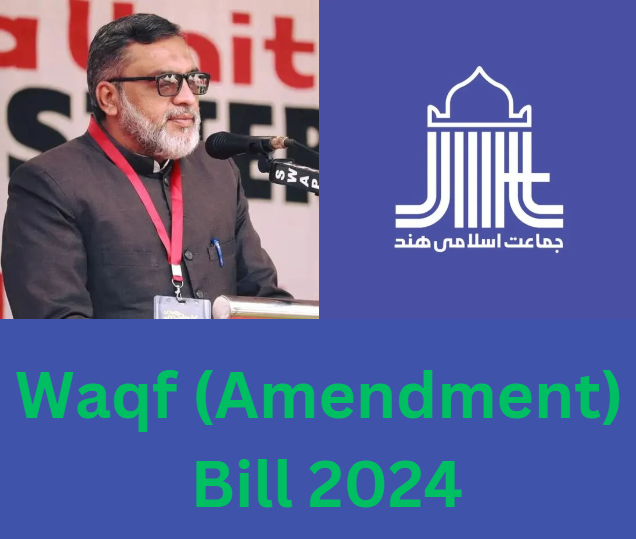New Delhi: Jamaat-e-Islami Hind (JIH) has submitted detailed supplementary written replies to the questions raised by the Joint Parliamentary Committee (JPC) after JIH leadership met with the JPC in November, last year.
In a statement to the media, the Vice President of Jamaat-e-Islami Hind, Malik Moatasim Khan said, “We received around 65 questions during our Submission to the JPC on 4th November 2024 over the Waqf (Amendment) Bill, 2024. The following is a summary of the queries by JPC and our written replies. These replies will also serve as a Supplementary to our earlier Submission to the JPC:
The questions posed by the Joint Parliamentary Committee primarily revolved around the definition, administration, and legal framework of Waqf properties. The hon’ble members of the JPC wanted to explore the religious and secular aspects of Waqf and know whether these properties benefit all communities or only Muslims.
Legal intricacies, such as the concept of “Waqf by User,” encroachments, and the role of Waqf boards, were frequently asked. JPC members inquired about procedural and structural issues, like the powers of the Collector and tribunal composition, pointing to potential constitutional and federal conflicts.
The JPC queries also dealt with the inclusion of non-Muslims in Waqf Management, and reforms to improve transparency and oversight. Members also posed historical and theological questions about Waqf’s origins and compatibility with modern governance.
The detailed written replies by Jamaat-e-Islami Hind (JIH) to the Joint Parliamentary Committee highlight critical concerns for the Muslim community regarding the proposed Waqf (Amendment) Bill, 2024. Central to the JIH responses is the apprehension that the Bill undermines the sanctity and functionality of Waqf properties, which have been vital for the socioeconomic and religious welfare of Muslims.
The provision to abolish “Waqf by User” poses a direct threat to numerous longstanding properties such as mosques, graveyards, and dargahs that lack formal documentation but have been in dedicated use for centuries. Removing this recognition will lead to widespread claims and legal disputes, leading to the potential loss of these assets.
The Bill’s proposal to give District Collectors the authority to determine Waqf status introduces a conflict of interest, as many encroachments on Waqf lands involve government departments. The transfer of such powers away from judicial bodies to the executive could jeopardise the community’s ability to contest encroachments effectively.
Another contentious issue is the five-year restriction of dedicating property as Waqf on certain Muslims. This not only violates constitutional principles of equality but also discriminates against Muslims, infringing on their religious freedoms as guaranteed under Articles 25 and 26 of the Constitution.
Furthermore, the inclusion of non-Muslims in Waqf Management Boards is an unjustifiable intrusion into the community’s ability to manage its religious and charitable endowments independently, a right enjoyed by other religious groups in India.
JIH emphasises that the Bill appears to favour encroachers by diluting criminal liability and narrowing the definition of Waqf. This, coupled with the lack of executive action to address longstanding issues like proper surveys of Waqf properties, is an attempt to centralise control and weaken Waqf Boards.
In its replies to queries by the JPC, JIH highlighted through the government’s own data, as reflected on the WAMSI portal, that the inefficiency and mismanagement of Waqf properties was due to executive lapses and not legislative shortcomings.
The JIH Vice President concluded saying, “Jamaat-e-Islami Hind (JIH) is committed to ensuring that the rights and development of Waqf properties are safeguarded for the welfare of the community and the nation. We want to ensure that any proposed legislative changes must uphold and protect the sanctity of Waqf assets and promote their effective utilisation for societal benefit. Hence, we are of the firm opinion that it is better to drop all the contentious amendments in the said Bill and focus instead on implementing existing Waqf laws effectively. We are ready to answer any further queries regarding Waqf properties and help the hon’ble members of the JPC and the general public to remove their doubts and concerns.”




